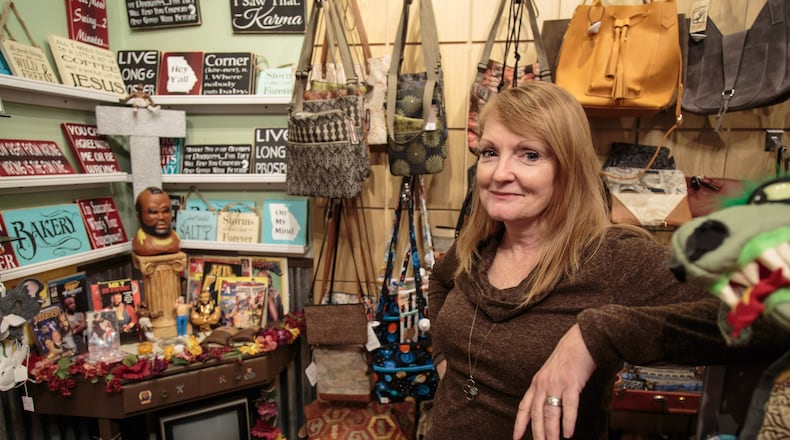The door opens to the enticing scents of spice, soap and candles drawing the customer into close quarters with a wash of colors, a chaos of crafts from designer flasks to risque posters.
HomeGrown in downtown Decatur was open early, its wares from 110 local artists ready for holiday shoppers. But in the era of massive stores of brick-and-mortar battling the everywhere-retail on the internet – is this any way to compete?
Well, said owner Lori Ronca, yes and no.
“I can’t bring down Amazon,” she said. “The difference is, we greet customers. We talk to customers. I stand outside and sweep the sidewalk and say hello to the mayor when she walks by. ‘Hello, Betty.’ ‘Hello, Lori.’ It’s about connection. That is what is missing with Amazon.”
Retailers had proclaimed the day Small Business Saturday, perhaps unintentionally placing their day in a symbolic vice between the two real-life threats to their survival: The day before was Black Friday, a frenzy of sales and promotions at huge chain retailers like Walmart, Target and Kohl's. Then, after the weekend, comes Cyber Monday with its push for more purchases online.
The National Retail Federation projected about 71 million people would shop on Small Business Saturday, a solid turnout when compared to the more traditional and better known Black Friday. About 115 million were expected to shop on Black Friday, the federation reported.
Online is a huge challenge to small retail, Ronca said, but it’s more than just the number of online shopping options, it’s the way it’s changed people’s behavior. “People don’t go out to spend the afternoon meandering through shops the way they used to.”
The path to success has grown increasingly narrow. For HomeGrown, it has been a combination of appealing to community, to its crafty, quirky offerings and to its cultivation of personality.
See, for example, the shrine to Mr. T in the back corner.
Ronca opened HomeGrown Decatur seven years ago with $7,000 after leaving her teaching job. She felt she didn’t have enough energy left at day’s end for her own children. But her degree was in teaching severely emotionally disturbed children.
Good for dealing with artists, maybe. But no kind of preparation for starting and running a business.
After a little more than a year in business, she got some help from the Georgia Small Business Development Center. An adviser helped her focus on what she was good at and farm out the rest.
“He asked, ‘what is your greatest weakness?’ And it was artists working the counter. It does not work.”
Instead she hired people and, as time went on, enlisted some of her children. Especially at the holidays.
“I make a schoolteacher’s living doing this. If I had to send my kids to college on this – no way. But $2 million has gone through this store into the pockets of local artists since I opened.”
Business depends on foot traffic. Ronca pulls up a computer graph showing that her busiest day last year was the final shopping day before Christmas.
“There was a line out the door and I went down the line giving out Debbie cakes and beer,” she said. “A big retailer can’t do that.”
American consumers are notorious for their focus on price. “The value here is the story,” Ronca said.
Also, at HomeGrown, money moves from local customers through the store to local artists who are also local consumers.
That reflects the potential millions in dollars for local economies because most small business sales stay in the communities where the purchases are made compared to that of big box retailers, said Nathan Humphrey, director of the Georgia office of the independent business group.
“Keeping the money in the local community with people you know is part of the emotional draw, ” he said.
On Saturday, Amber Edgerton, 33, of Decatur, wandered through the store with husband Daniel carrying 12-week-old Felix.
“We like shopping local, it helps the community and supports local artists,” she said.
Having moved earlier this year from near Athens, they like the busy-ness of downtown, the the feel of the store and they find themselves at the back of the store, not far from the shrine to Mr. T, looking at some prints.
“I think we’ll probably buy some,” she said. “Maybe that one, the ‘Isle of ITP,’ now that we are inside the Perimeter.”
Still, the wave has been running against small retailers for a long time, even in the area around her in downtown Decatur. Failure has many causes, Ronca said.
Some were open only during hours when most people are at work. Others found themselves selling something that could be bought cheaper or easier online or at a giant chain – and they weren’t selling anything besides that commodity.
The commodity is not enough, Ronca said.
“It’s about creating an atmosphere that is different from a Kohl’s or Target. Yes, we want them to open their wallets, but we want them to have an experience.”
About the Author
Keep Reading
The Latest
Featured



